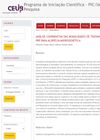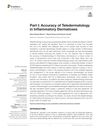4 citations,
January 2017 in “Acta dermato-venereologica” A new EDA gene mutation was found in a Chinese family with a specific skin disorder.
 17 citations,
August 2019 in “Frontiers in Immunology”
17 citations,
August 2019 in “Frontiers in Immunology” Non-invasive methods show promise for diagnosing skin diseases like psoriasis and lupus but need more research for regular use.

CaBP1 and 2 are necessary for maintaining calcium currents and hearing in inner ear cells.

CaBP1 and CaBP2 are important for continuous hearing by preventing inactivation of calcium currents in ear cells, with CaBP2 also able to restore hearing when reintroduced.
 14 citations,
July 2016 in “Anatomical Science International”
14 citations,
July 2016 in “Anatomical Science International” The study suggests that the arrector pili muscle is important for hair health and its damage might contribute to hair loss.
 January 2023 in “Records of Pharmaceutical and Biomedical Sciences”
January 2023 in “Records of Pharmaceutical and Biomedical Sciences” Surfactants in spanlastics improve drug delivery by making nanovesicles more flexible and stable for painless administration through the mouth.
 1 citations,
December 2022 in “Frontiers in Bioengineering and Biotechnology”
1 citations,
December 2022 in “Frontiers in Bioengineering and Biotechnology” New pharmaceutical biomaterials, especially nanomaterials, show promise for improving cancer treatment and disease diagnosis.
 1 citations,
May 2021 in “Revista Eletrônica Acervo Científico”
1 citations,
May 2021 in “Revista Eletrônica Acervo Científico” The document concludes that more research is needed on treatments for hair loss in both men and women, especially on medication combinations and their benefits.
 April 2022 in “Journal of The American Academy of Dermatology”
April 2022 in “Journal of The American Academy of Dermatology” The document suggests that nerve issues might contribute to hair loss and that testing sensation could predict these nerve problems.
 70 citations,
February 2017 in “Dermatologic Surgery”
70 citations,
February 2017 in “Dermatologic Surgery” Treatment with plasma rich in growth factors improved hair density and thickness for hair loss patients.
 1 citations,
July 2022 in “Pakistan biomedical journal”
1 citations,
July 2022 in “Pakistan biomedical journal” Transethosomes improve drug delivery through the skin by overcoming the outer skin layer's barrier.
 June 2022 in “Frontiers in Genetics”
June 2022 in “Frontiers in Genetics” Machine learning is effective in predicting gene functions and their relationships with diseases.
 4 citations,
March 2006 in “Archives of Dermatology”
4 citations,
March 2006 in “Archives of Dermatology” The conclusion is that dermatologists can improve women's skin health but must overcome cultural and economic barriers to do so.
23 citations,
March 2019 in “Gene” Editing the FGF5 gene in sheep increases wool length, confirming its role in hair growth.
 9 citations,
January 2006 in “American Journal of Clinical Dermatology”
9 citations,
January 2006 in “American Journal of Clinical Dermatology” Malassezia yeast might be linked to more hair shedding.
 February 2022 in “Programa de Iniciação Científica - PIC/UniCEUB”
February 2022 in “Programa de Iniciação Científica - PIC/UniCEUB” Both Minoxidil and PRP are effective for male pattern baldness treatment.
 27 citations,
November 2013 in “Journal of Dermatological Science”
27 citations,
November 2013 in “Journal of Dermatological Science” The conclusion is that androgenetic alopecia and senescent alopecia have unique gene changes, suggesting different causes and potential treatments for these hair loss types.
 January 2022 in “Maxillofacial Plastic and Reconstructive Surgery”
January 2022 in “Maxillofacial Plastic and Reconstructive Surgery” The book is a detailed guide on facial cosmetic surgery techniques and advancements, useful for both trainees and specialists.
 5 citations,
January 2006 in “Journal of obstetrics and gynaecology”
5 citations,
January 2006 in “Journal of obstetrics and gynaecology” Metformin can cause hair loss in some women with PCOS.
7 citations,
January 2022 in “Biomedicines” Cells from the lower part of hair follicles are a promising, less invasive option for immune system therapies.
 January 2022 in “Eduvest”
January 2022 in “Eduvest” A teenage girl with a fungal scalp infection got better with antifungal and allergy medication, plus medicated shampoo.

Mesenchymal stem cells could potentially help regenerate hair in people with hair loss.
 12 citations,
January 1984 in “Anesthesia & Analgesia”
12 citations,
January 1984 in “Anesthesia & Analgesia” Anesthesia and surgery can cause temporary hair loss, but hair usually grows back without treatment.
 18 citations,
May 2013 in “Cutaneous and Ocular Toxicology”
18 citations,
May 2013 in “Cutaneous and Ocular Toxicology” The cancer drugs bortezomib and lenalidomide cause skin side effects in many patients.
 2 citations,
August 2021 in “Photodiagnosis and Photodynamic Therapy”
2 citations,
August 2021 in “Photodiagnosis and Photodynamic Therapy” Using 5-aminolevulinic acid photodynamic therapy for hair loss didn't increase hair growth but slightly reduced scalp oiliness, and it was safe with mild side effects.
Hairlessness in mammals is due to complex genetic changes in both genes and regulatory regions.
 September 2023 in “Scientific reports”
September 2023 in “Scientific reports” Segmental hair analysis can track testosterone over time but needs adjustments for sex, hair color, and washing frequency.
The man likely has secondary syphilis affecting his nervous system.
 2 citations,
May 2023 in “Journal of Advanced Research”
2 citations,
May 2023 in “Journal of Advanced Research” Two mutations in KRT74 and EDAR genes cause sheep to have finer wool.
 13 citations,
October 2020 in “Frontiers in Medicine”
13 citations,
October 2020 in “Frontiers in Medicine” Teledermatology is highly accurate for diagnosing inflammatory skin conditions.
























